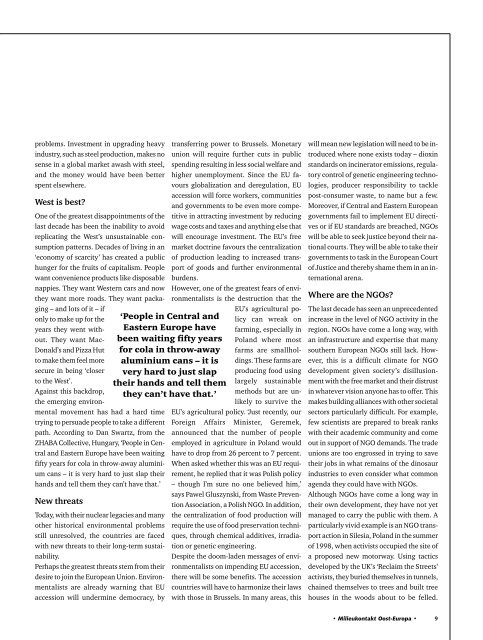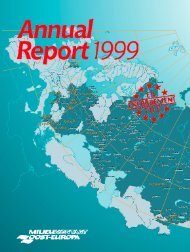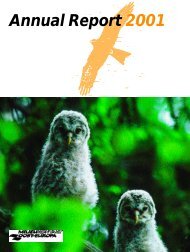Russia and Ukraine - Milieukontakt International
Russia and Ukraine - Milieukontakt International
Russia and Ukraine - Milieukontakt International
Create successful ePaper yourself
Turn your PDF publications into a flip-book with our unique Google optimized e-Paper software.
problems. Investment in upgrading heavy<br />
industry, such as steel production, makes no<br />
sense in a global market awash with steel,<br />
<strong>and</strong> the money would have been better<br />
spent elsewhere.<br />
West is best?<br />
One of the greatest disappointments of the<br />
last decade has been the inability to avoid<br />
replicating the West’s unsustainable consumption<br />
patterns. Decades of living in an<br />
‘economy of scarcity’ has created a public<br />
hunger for the fruits of capitalism. People<br />
want convenience products like disposable<br />
nappies. They want Western cars <strong>and</strong> now<br />
they want more roads. They want packa-<br />
ging – <strong>and</strong> lots of it – if<br />
only to make up for the<br />
years they went without.<br />
They want Mac-<br />
Donald’s <strong>and</strong> Pizza Hut<br />
to make them feel more<br />
secure in being ‘closer<br />
to the West’.<br />
Against this backdrop,<br />
the emerging environmental<br />
movement has had a hard time<br />
trying to persuade people to take a different<br />
path. According to Dan Swartz, from the<br />
ZHABA Collective, Hungary, ‘People in Central<br />
<strong>and</strong> Eastern Europe have been waiting<br />
fifty years for cola in throw-away aluminium<br />
cans – it is very hard to just slap their<br />
h<strong>and</strong>s <strong>and</strong> tell them they can’t have that.’<br />
New threats<br />
Today, with their nuclear legacies <strong>and</strong> many<br />
other historical environmental problems<br />
still unresolved, the countries are faced<br />
with new threats to their long-term sustainability.<br />
Perhaps the greatest threats stem from their<br />
desire to join the European Union. Environmentalists<br />
are already warning that EU<br />
accession will undermine democracy, by<br />
‘People in Central <strong>and</strong><br />
Eastern Europe have<br />
been waiting fifty years<br />
for cola in throw-away<br />
aluminium cans – it is<br />
very hard to just slap<br />
their h<strong>and</strong>s <strong>and</strong> tell them<br />
they can’t have that.’<br />
transferring power to Brussels. Monetary<br />
union will require further cuts in public<br />
spending resulting in less social welfare <strong>and</strong><br />
higher unemployment. Since the EU favours<br />
globalization <strong>and</strong> deregulation, EU<br />
accession will force workers, communities<br />
<strong>and</strong> governments to be even more competitive<br />
in attracting investment by reducing<br />
wage costs <strong>and</strong> taxes <strong>and</strong> anything else that<br />
will encourage investment. The EU’s free<br />
market doctrine favours the centralization<br />
of production leading to increased transport<br />
of goods <strong>and</strong> further environmental<br />
burdens.<br />
However, one of the greatest fears of environmentalists<br />
is the destruction that the<br />
EU’s agricultural policy<br />
can wreak on<br />
farming, especially in<br />
Pol<strong>and</strong> where most<br />
farms are smallholdings.<br />
These farms are<br />
producing food using<br />
largely sustainable<br />
methods but are unlikely<br />
to survive the<br />
EU’s agricultural policy. ‘Just recently, our<br />
Foreign Affairs Minister, Geremek,<br />
announced that the number of people<br />
employed in agriculture in Pol<strong>and</strong> would<br />
have to drop from 26 percent to 7 percent.<br />
When asked whether this was an EU requirement,<br />
he replied that it was Polish policy<br />
– though I’m sure no one believed him,’<br />
says Pawel Gluszynski, from Waste Prevention<br />
Association, a Polish NGO. In addition,<br />
the centralization of food production will<br />
require the use of food preservation techniques,<br />
through chemical additives, irradiation<br />
or genetic engineering.<br />
Despite the doom-laden messages of environmentalists<br />
on impending EU accession,<br />
there will be some benefits. The accession<br />
countries will have to harmonize their laws<br />
with those in Brussels. In many areas, this<br />
will mean new legislation will need to be introduced<br />
where none exists today – dioxin<br />
st<strong>and</strong>ards on incinerator emissions, regulatory<br />
control of genetic engineering technologies,<br />
producer responsibility to tackle<br />
post-consumer waste, to name but a few.<br />
Moreover, if Central <strong>and</strong> Eastern European<br />
governments fail to implement EU directives<br />
or if EU st<strong>and</strong>ards are breached, NGOs<br />
will be able to seek justice beyond their national<br />
courts. They will be able to take their<br />
governments to task in the European Court<br />
of Justice <strong>and</strong> thereby shame them in an international<br />
arena.<br />
Where are the NGOs?<br />
The last decade has seen an unprecedented<br />
increase in the level of NGO activity in the<br />
region. NGOs have come a long way, with<br />
an infrastructure <strong>and</strong> expertise that many<br />
southern European NGOs still lack. However,<br />
this is a difficult climate for NGO<br />
development given society’s disillusionment<br />
with the free market <strong>and</strong> their distrust<br />
in whatever vision anyone has to offer. This<br />
makes building alliances with other societal<br />
sectors particularly difficult. For example,<br />
few scientists are prepared to break ranks<br />
with their academic community <strong>and</strong> come<br />
out in support of NGO dem<strong>and</strong>s. The trade<br />
unions are too engrossed in trying to save<br />
their jobs in what remains of the dinosaur<br />
industries to even consider what common<br />
agenda they could have with NGOs.<br />
Although NGOs have come a long way in<br />
their own development, they have not yet<br />
managed to carry the public with them. A<br />
particularly vivid example is an NGO transport<br />
action in Silesia, Pol<strong>and</strong> in the summer<br />
of 1998, when activists occupied the site of<br />
a proposed new motorway. Using tactics<br />
developed by the UK’s ‘Reclaim the Streets’<br />
activists, they buried themselves in tunnels,<br />
chained themselves to trees <strong>and</strong> built tree<br />
houses in the woods about to be felled.<br />
• <strong>Milieukontakt</strong> Oost-Europa • 9





